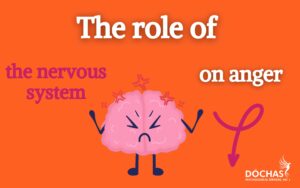Have you ever found yourself feeling inexplicable anger, with no clear reason for the emotion? It’s a common experience, and while it might seem like your anger comes out of nowhere, there’s often more going on beneath the surface.
It’s Pooja on the blog this week, and by exploring the concepts of somatic experiencing and the nervous system, we can begin to understand why these feelings arise and how they are deeply rooted in our physiology. Also, there are behavioural strategies you can employ to manage and understand these emotions better.
The Role of the Nervous System on Anger

Our nervous system is constantly working to help us navigate the world, responding to external stimuli and internal states. It’s a complex network that regulates everything from our heart rate to our emotional responses. One of the key components of the nervous system is its ability to detect and respond to threats: a process often referred to as the fight-or-flight response.
When we perceive a threat, whether real or imagined, our nervous system activates a cascade of physiological changes designed to prepare us for action. This response can manifest as anger, which is the body’s way of mobilizing energy to confront the threat. However, in our modern world, these threats are often not as clear-cut as a physical danger. They might be subtle stressors, unresolved traumas, or even internal conflicts that we’re not fully conscious of. As a result, the nervous system might still trigger an anger response even when there seems to be “no reason” for it.
Understanding Somatic Experiencing
Somatic experiencing is a therapeutic approach developed by Dr. Peter Levine, which focuses on the body’s experience of trauma and stress. According to this model, emotions like anger can become “trapped” in the body when the nervous system doesn’t fully process a traumatic event or stressor. Over time, these unprocessed emotions can emerge seemingly out of nowhere, often triggered by unrelated events or internal states.
For example, someone who has experienced chronic stress or trauma may have a heightened sensitivity to certain stimuli, even if those stimuli aren’t directly related to the original stressor. The body might react with anger as a way to protect itself, even if the person isn’t consciously aware of why they’re feeling that way.
Watch my video or keep reading to understand why you feel angry for no reason!
The Link Between Unprocessed Emotions and Anger
Unprocessed emotions are a significant factor in why people might feel angry for “no reason.” When we don’t fully process our emotions—either because they’re too overwhelming or because we’ve been conditioned to suppress them—they don’t simply disappear. Instead, they linger in the body, stored in the nervous system, waiting for an opportunity to be released. This can result in sudden, inexplicable bursts of anger, which are actually the body’s way of attempting to resolve these lingering emotions.
Somatic experiencing offers a way to address this by helping individuals become more aware of their bodily sensations and the emotions associated with them. Through this process, people can begin to release the pent-up energy associated with unprocessed emotions, reducing the likelihood of experiencing sudden anger.
Behavioural Strategies for Managing Unexplained Anger
While understanding the root causes of your anger is crucial, it’s equally important to have strategies to manage and respond to these emotions in real time. Here are some practical steps you can take:
Practice mindfulness to increase your awareness of when and how anger arises. Mindfulness involves paying attention to your thoughts, feelings, and bodily sensations in the present moment without judgment. This can help you catch the early signs of anger and address them before they escalate. Alicia’s blog explains how to cultivate mindfulness through gardening!
Grounding Techniques:
When you feel anger rising, grounding techniques can help you stay present and calm. Simple exercises like focusing on your breath, feeling the ground under your feet, or holding a cold object can bring your attention back to the present moment and reduce the intensity of your emotions.
Regularly check in with your body through a body scan meditation. This involves mentally scanning your body from head to toe, noticing any areas of tension or discomfort. By doing this, you can become more attuned to the physical manifestations of your emotions and address them before they turn into anger.
Physical Activity:
Engaging in regular physical activity can help release built-up tension and energy that might otherwise manifest as anger. Activities like yoga, tai chi, or even a brisk walk can be particularly effective in calming the nervous system.
Expressive Writing:
Journaling can be a powerful way to process unexpressed emotions. Set aside time each day to write freely about what you’re feeling, even if it doesn’t make logical sense. This can help you release pent-up emotions in a safe and constructive way.
Seek Support:
Sometimes, unexplained anger is a sign that you need support. Talking to a therapist or psychologist, especially one trained in somatic experiencing, can help you explore the underlying causes of your anger and develop strategies for managing it. If you are looking for extra support with anxiety, please reach out to Dóchas at 780-446-0300 or info@dochaspsych.com. Book an in-person (Spruce Grove, Alberta) or virtual appointment with one of our therapists here.
Self-Compassion:
Practice self-compassion by acknowledging that it’s okay to feel angry, even if you don’t understand why. Instead of judging yourself for your emotions, treat yourself with kindness and understanding. This can help reduce the intensity of your anger and make it easier to manage.
Try the free Dóchas LifeJacket App:
The Dóchas Lifejacket is an app we created to help you regulate your emotions and manage stress. With just a few swipes, the app gives you personalized strategies based on how you feel in that moment that you can use to calm down. When you’re stressed out or feel like everything’s falling apart, our app does the thinking for you. It helps to support you in the moment, like a lifejacket, so that you don’t sink. Try out the LifeJacket App!
Final Thoughts
In conclusion, the next time you find yourself feeling angry without a clear cause, it’s worth considering what might be happening beneath the surface. Our bodies carry the weight of our past experiences, and sometimes, those experiences express themselves through our emotions in ways that aren’t immediately obvious. By tuning into our bodies, paying attention to the signals from our nervous system, and using behavioral strategies to manage our emotions, we can start to understand these emotions and work towards resolving them.
About Dóchas Psychological
Dóchas Psychological Services is a well-established and trusted therapy clinic located in Spruce Grove, Alberta. At Dóchas we value the idea that everyone deserves a safe space. Through connection and education, our team works hard to build a trustworthy relationship with each of our clients. It is our goal to create a community for our clients to feel like they belong.
Disclaimer
Information provided through Dóchas Psychological Services blogs or vlogs is meant for educational purposes only. They are NOT medical or mental health advice. You can read more about our disclaimer here.









